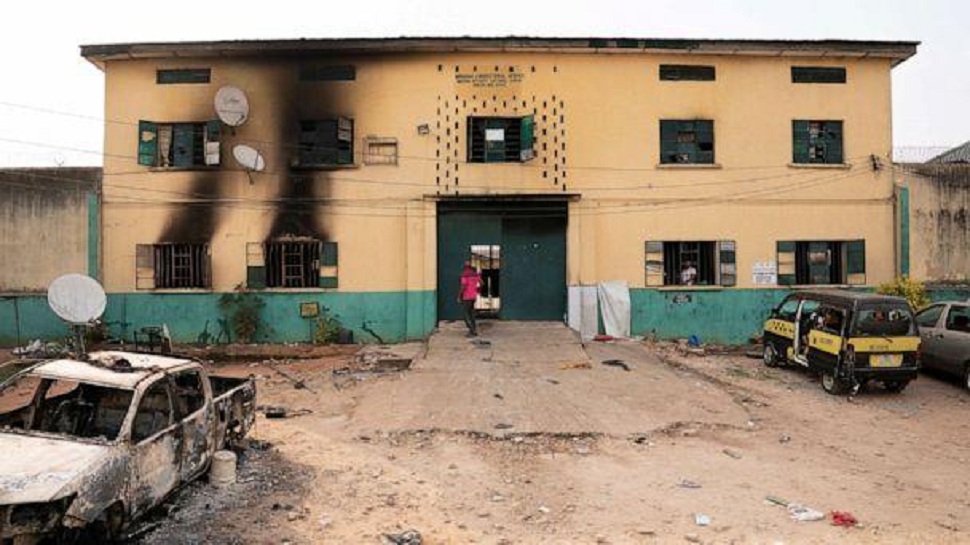Soldiers have returned to their correctional centres duty posts in Ondo State, a development which delights Governor Oluwarotimi Akeredolu, who has openly welcome the return.
The return is coming few days after the governor raised an alarm that withdrawal by the Nigerian Army of soldiers from correctional centres across the state was encouraging jail breaks which have recently been on the rise.
Describing the return as a welcome development, he said the Nigerian Army has allowed good reasoning to prevail in the interest of the people.
In a statement by his Chief Press Secretary, Mr Richard Olatunde, he noted that the initial withdrawal of the officers from the correctional centres was an aberration and an undue security risk.
His words: “We note the return of soldiers to the correctional centers as concerting. The security of lives and property of our people remain a onerous task that must be carried out without hesitation or sentiment.
“A federal facility like the correctional center should not have been left without deserving security for any reason. However, the return of the soldiers to the facilities is a positive development.
“Both the Nigerian Army and the Correctional centers belong to the Federal Government. There must be continuous synergy. We will also continue to do our best to give the necessary support when the need arises.” Akeredolu Says Soldiers’ Withdrawal From Correctional Centres Encourages Jailbreaks
Akeredolu had on January 5 raised an alarm that withdrawal by the Nigerian Army of soldiers from correctional centres across the state was encouraging jail breaks which have recently been on the rise.
The governor, who received a full briefing of the situation from the Commissioner of Police, Oyediran Oyeyemi, was worried about the fall out of the withdrawal according to a statement by his Chief Press Secretary, Mr Richard Olatunde.
Noting that Akeredolu wondered why soldiers will be withdrawn from correctional centres which belong to the Federal Government, the statement then said: “Last night, Governor Akeredolu received reports from the Commissioner of Police in the state that soldiers attached to the correctional centers in the state have all been withdrawn.
“This development came as a surprise, considering the fact that both the Nigerian Army and the Nigerian Correctional Centers belong to the Federal Government.
“The Governor was more bothered about the overflow effect of the soldiers withdrawal on the security situation in the state. More so that such action could easily encourage jail breaks across the state.
“It is, however, pertinent to alert members of the public and the Federal Government of this unwholesome situation. Findings into the remote cause of this action has only revealed that it was an order from above without corresponding details.
“The situation notwithstanding, proactive efforts have been made to secure these centers so as not to allow premeditated jail breaks as whoever gave order to withdraw those soldiers was in the process of encouraging such.”
It said that Akeredolu has met with other security heads in the state, particularly the Police and charged them to take over their responsibility of internal security in the state.
It added: “While we believe that the Federal Government has a duty to protect the prisons, we are more concerned about the security of our people across the state. A jail break will not only threaten the peaceful atmosphere we are enjoying in the state, it will pose serious danger to our people .
“Governor Akeredolu has met with the security heads and the Police has since last night taken up their responsibility of internal security by deploying armed Police officers to these correctional centers.
“Similarly, the Nigeria Security and Civil Defence Corps (NSCDC) whose main assignment is to secure Federal Government facilities, has also deployed armed officers to the correctional facilities.
“Governor Akeredolu has also directed the deployment of men of the State Security Network (Amotekun) to complement the Police and the NSCDC. This is to ensure that any premeditated action is tamed and resisted with commensurate force.”
Growing Concern As Correctional Facilities Nationwide Risk More Jailbreaks
There have been growing concerns across the country as over 3, 000 escaped inmates were said to be on the loose amid complaints that overcrowding is fueling jailbreak attempts, which experts linked to a worrisome spike in crime rates.
Amid mounting insecurity challenges, the Federal Government reportedly appears to have yet another bout of headache to contend with.
The Guardian had recently reported that the nation’s correctional facilities frequently come under violent attacks leading to jailbreaks and attempted jailbreaks even though billions of naira is budgeted on security and running of various custodial centres.
Many are of the view that these jailbreaks may worsen if strict action is not taken and this could add to the security challenges facing the country as some hardened criminals team up with kidnapping, terrorist and other criminal gangs. Currently, not less than 3,000 escaped inmates are already on the loose.
Tasked with the administration of prisons and other non-custodial measures in the country, the Nigeria Correctional Service (NCoS), formerly known as the Nigeria Prisons Service (NPS), has continued to remain in the limelight as one of the most controversial government agencies in recent times due to the growing trend in jailbreaks.
Even though huge budgetary allocations have been made and billions have been spent by the agency, the situation and plight of Nigerian inmates has continued to remain a topic of discussion as almost all the custodial centres are overcrowded, poorly ventilated and unsanitised with dilapidated structures, while the inmates are poorly fed.
Nine months ago, the House of Representatives expressed displeasure at the state of the custodial centres and made attempt to probe a N613,462,338,602 allocated to the agency in the last 10 years (2010-2019), noting that the Federal Government is spending N17 billion every year to feed inmates in 244 correctional centres but inmates still live in unconducive environment, a situation they said amounts to the violation of their human rights.
Available statistics show that the current administration has so far made the highest allocations to the prison sector in the history of the agency, but the impact is yet to show as the constant challenge of overcrowding persists.
According to media reports, the sum of N4 billion was allocated in 2015; N14 billion in 2016; N16.6 billion in 2017; while higher allocations were made in 2018 and 2019, with each year having over 70% recurrent expenditure.
The attacks on the custodial centre in Owerri and Benin have raised security concerns in many quarters as to how fortified custodial facilities in the country are, especially with the foiled jailbreak at Kurmawa custodial centre in Kano just weeks after the Owerri attack.
About two weeks ago, another jailbreak attempt was prevented in Bauchi State custodial centre, adduced to restiveness of the inmates. The attempt also involved an officer of the prison reported to have been under investigation.
The attempt is believed to have been triggered by a ban preventing the over 900 inmates from having visitors, causing a disconnection of inmates from their loved ones. This led to a demonstration where two officers and many inmates were injured.
Observers say the situation across the country is such that inmates have become more restless, resulting in frequent jailbreak attempts and many wonder how much outside help prisoners are able to garner despite being locked up in any of the prisons (security prisons, juvenile/minor’s correctional facility, female only prisons, psychiatric prisons or military prisons).
Executive Director of Prisoners Rehabilitation and Welfare Action (PRAWA), Dr. Uju Agomoh, said jailbreaks in Nigeria is indicative of the high level of insecurity in the country and underscores the need for more investment in justice security and development.
According to her, “when inmates break out of custodial centres before their due dates of release, the risk of recidivism (going back to committing more offences), is very high. In addition, jailbreak creates fear and leaves members of the society in perpetual anxiety.”
She said poor security architecture of custodial centres and the absence of monitoring devices, makes them susceptible to sabotage and attacks.
According to the authorities, custodial centres are reformation grounds for those convicted of an offence to spend some time in isolation and ponder over their actions and change for the better by following a defined and planned routine before they are sent back to reintegrate into the society.
But it appears the much-talked about prison reforms of the government have continued to elude the nation in the face of poor state of custodial centres, overcrowding, largely due to the huge number of inmates awaiting trial and slow pace in justice delivery.
For instance, Owerri prison, which suffered a breach on April 12, was initially designed to accommodate 500 inmates, but housed 1,844 inmates, both those serving their jail terms and those awaiting trial before the break.
There have been reports of inmates spending as much as 27 years in prison, awaiting trial. Some of whom, never saw justice while others were given state pardon after spending decades in prison.
MEANWHILE, many of the fleeing inmates (about 1600), are still at large despite prison authorities releasing their passports to the general public seeking information regarding their whereabouts.
Outgoing Public Relations Officer (PRO) of the NCS in the state, James Madugba, told The Guardian that there was “mass transfers of officers” in the centre as a measure of fortification. “There are mass transfers of officers now. I have been transferred to Aba, Abia State.”
At Oko custodial centre and Benin prison in Edo, while some of the reported 1,835 escaped inmates were re-arrested and some returned voluntarily (total of 141), about 1,797 others are still at large. Giving a breakdown of the escapees, the PRO of the Nigeria Correctional Service (NCoS), Edo command, Aminu Suleiman, said: “The total number of inmates in the two facilities as of the time of jailbreak were 1,993.
However, 1,835 were reported to be at large after headcount was made. Those that came back on their own and those recaptured are 141 inmates. Over 1600 are still at large.”
While the #EndSARS protest raged, hoodlums under the guise of protesters stormed another custodial centre in Okitipupa, Ondo State, releasing 58 inmates. In the same period, a jailbreak was frustrated in Lagos Ikoyi custodial centre.
In Ilorin, Kwara State capital, investigations revealed that the two custodial centres at Oke Kura, built in 1914, are expectedly ancient but still have strong, solid fence with an imposing entrance gates but are all overcrowded. The capacity of ‘Mandala’ Prison is about 115 persons but at present, over 500 inmates are accommodated there.
A source said: “Our weapons are obsolete, and when those attacking from outside have superior fire power, our officers will have no other option than to give way to reduce the casualty toll. We need to also note that even though we sometimes beckon on our sister organisations for help when overwhelmed, the truth is that the Federal Government had for long neglected the paramilitary arms but concentrated more on the military.”
In Abia State, prison officials have called on the state government to assist them with operational logistics. State Comptroller of NCoS, Mr Julius Ezugwu, said the state needs more support in terms of logistics.
The Guardian checks show that the three correctional centers in Abia house a total of 1,536 inmates, out of which only 120 were convicted and are serving their terms while 1,416 are awaiting trial.
In Taraba State, residents of some communities hosting the correctional centres said they now live in fear of jailbreaks and attacks because many of the prisons are congested and not well secured.
Alhaji Aminu Ali, who could not fathomed why the relevant authorities have been dragging their feet “in this matter” said “we have long been calling for the relocation of this prison because this area is no longer safe.”
In Jalingo, the capital of Taraba, the structures are presently dilapidated. The roof sheet have not only made it possible for the scorching sun to have direct access to the prisoners, but also made it easy for rainfall to penetrate the buildings. At the time of filing this report, several attempts to speak with both the comptroller and the image maker of the centre failed, but a senior official of the centre who agreed to bare his mind to our correspondent on condition of anonymity, said for the incessant intervention of both the faith-based organisations and NGOs, “the situation of correctional centres in this state would have been worse.”
Another officer at the centre, said: “Can you believe that we sometimes find it difficult to convey our inmates to courts? Even to take them to hospitals for treatment whenever they fall sick is always a problem for us because government is not assisting to improve the condition of inmates in Taraba.”
For Rivers State, security in and out of the correctional centre in Borikiri, Port Harcourt, has been beefed up following recent attacks on Imo State.
Checks by The Guardian revealed that two security vans were stationed at the premises of the facility with some security personnel patrolling inside and around the facility.
Further observations show that most of the facilities were dilapidated and in need of repairs. Some of the buildings were worn out, while the premises were overgrown with weed.
In an interview, Comptroller of Correctional Services in the state, Alex Oditah, said the Command was working with the police and other agencies to tighten security at the facility to avoid a repeat of the incidences in Owerri.
Oditah, who lamented overpopulation of the cells occasioned by the strike action embarked upon by the Judiciary Staff Union of Nigeria (JUSUN), said the command had to release inmates who served out their period of stay.
According to him, “We are not playing politics about that, the cells are congested and overpopulated. Once in a while, we liaise with the state government through the Ministry of Justice to come over for jail delivery to release inmates that have stayed long.”
Meanwhile, at the national headquarters of the NCoS in Abuja, PRO of the agency, Francis Enobore, said the Federal Government is taking a number of measures to ensure a non-repeat of jailbreaks and one of the measures is the articulation of intelligence gathering with a number of agencies for early warning signals on jailbreak attempts.
Although the PRO evaded questions on the number of inmates the agency has lost to jail attacks and jail breaks in the last year, he was quick to point that all necessary measures are being taken to forestall future attacks.
The Guardian





